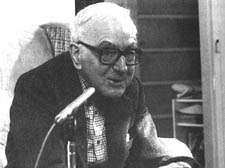|
|
 |
| |
The last of the fierce, individual history boys
As history becomes a coffee-table book diversion, AJP Taylor’s brand of populist radicalism is sadly missed, writes Illtyd Harrington
THE last time I saw him he was hurrying down Hampstead Road looking more than ever like the White Rabbit in the opening pages of Alice in Wonderland.
The scholar’s stoop, the huge glasses and the assertive bow tie.
AJP Taylor, the most widely known Oxford don, was always busy. We exchanged a perfunctory good morning and TV’s history man disappeared down the black hole of Thames Television.
This is the third biography of this complex, brittle, unpredictable man who was accused of holding beliefs as contradictory as Stalinism, Nihilism and Trotskyism, and was known to the less reverent as the Diva of Drama Queens.
Taylor was born into a prosperous cotton family in Manchester in 1906. His father Percy and his mother Connie Thompson moved from worshipping in non-conformist chapels into the exciting whirlpool of bubbling left-wing politics.
Connie shared her dialectical mind and much else with the left-wing radical Henry Sara, ultimately becoming a couple of revolutionary Marxists. These intellectual ménage-a-trois antics may account for AJP’s tormented sexual life. A very precocious and only child, his favourite book was Bunyan’s Pilgrim’s Progress, where giants are slain.
Coasting into Oxford University AJP joined the Communist Party and picked up first-class honours. Thereafter he always saw himself not as a Marxist incendiary but a gentlemen scholar.
He met Margaret Adams but ran away from Marylebone Registry Office at the first botched attempt at marriage. With grim determination he persevered and went through with the ceremony at the second attempt.
All of this matrimonial bliss was shattered by the arrival of the Welsh poetic genius Dylan Thomas. Margaret was besotted with Dylan, who found his way smoothly to her heart and to the Taylors’ bank account. She even bought him a caravan and parked it in Delancey Street.
His cerebral love affair with Oxford University became a roaring passion, but his fellowship of Magdalen College plus his growing reputation as the historian of middle Europe did not satisfy his appetite for fame and individual persona.
Scholars who thought with the religious intensity of Medieval monks could only take so much and treated him with spite, if not vindictiveness. When he erupted on the television public of the 1970s their jealousy and urge to recriminate became dangerous.
His television lectures which seemed spontaneous drew audiences of millions and filled BBC bosses with trepidation. Forty years later David Starky and Simon Schama turned history into a coffee-table book – a diversion not a weapon.
Taylor enjoyed the precariousness of his reputation. The advent of CND and its chant “ban the bomb” saw him in the frontline against the theory of nuclear deterents. He enjoyed the nationwide mass meetings.
On his against list were the Germans, the Common Market and mean publishers who allegedly tried to short change him.
Given to outbursts of temper he once turned his back on the TV camera for 10 minutes of a live show.
Worn down by the Dylan and Margaret scenario he separated from her. Later they divorced and both remarried, yet he constantly went back to their Camden home in St Mark’s Crescent.
Taylor even came back when he married Eve Crossland, a student 17 years his junior, still juggling with two women’s affections and two families and three different places to live.
His two great historical women were Queen Victoria and Marie Stopes, the sexual liberator. But his great men were Napoleon, Bismarck and Lenin – a rich ground for Freudians to plough.
Demonised by the Right, nevertheless Taylor was taken up by Lord Beaverbrook, that pillar of Tory reaction who took him under his swooping wings where a mutual admiration society developed.
After divorcing Eve he embarked on a long relationship, mostly scholastic, with Eva Haraszti a Hungarian historian. They married and went to live in Twisden Road, Hampstead.
Taylor was knocked down by a taxi while going to buy coffee in Old Compton Street. A long decline followed and he died in a Finchley nursing home in September 1996.
He willingly allowed himself to be used as one of the prominent people suffering from Parkinsons on a Tube poster.
Chris Rigby, Professor of Modern British History at Nottingham University, has served him well.
But the only Naughty, Sulky Boys of history we have left now are Alan Bennett’s. He was the last of the irascible, fiercely individual historians. Perhaps populist history died with him.
|
 |
 |
|
 |
|


